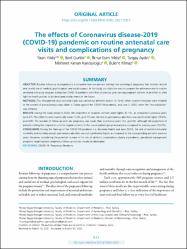The effects of Coronavirus disease-2019 (COVID-19) pandemic on routine antenatal care visits and complications of pregnancy

View/
Access
info:eu-repo/semantics/openAccessDate
2021Author
Yıldız, YasinGürlek, Beril
Yıldız, İlknur Esen
Aydın, Turgay
Kanburoğlu, Mehmet Kenan
Yılmaz, Bülent
Metadata
Show full item recordCitation
Yildiz, Y., Gurlek, B., Yildiz, I.E., Aydin, t., Kanburoglu, M.K. & Yilmaz, B. (2021). The effects of Coronavirus disease-2019 (COVID-19) pandemic on routine antenatal care visits and complications of pregnancy. Revista da Associacao Medica Brasileira, 67(6), 833-838.Abstract
OBJECTIVE: Routine follow-up of pregnancy is a comprehensive care process starting from planning of pregnancy that involves rational and careful use of medical, psychological, and social support. In this study, our objective was to compare the adherence rate to routine antenatal follow-up program during the COVID-19 pandemic with that of previous years among pregnant women, in an effort to shed light on health policies to be developed similar events in the future.
METHODS: This retrospective cross-sectional study was carried out between March 11, 2019, when isolation measures were initiated in the context of precautionary steps taken in Turkey against the COVID-19 pandemic, and June 1, 2020, when the "normalization" was initiated.
RESULTS: During the study period in 2020, the proportion of cesarean sections were higher, 61.1%, as compared to previous years (p=0.27). The stillbirths were numerically lower (1.2%, p=0.77), but the rate of spontaneous abortions was significantly higher (19.6%, p=0.009). The number of follow-up visits per pregnancy was lower than in previous years (3.8, p=0.02), although the proportion of patients visiting the outpatient units for regular controls to the overall patient group increased as compared to previous years (52.0%).
CONCLUSION: During the flare-up of the COVID-19 pandemic (i.e. between March and June 2020), the rate of obstetric/neonatal morbidity and mortality except spontaneous abortion was not significantly higher as compared to the corresponding period in previous years. However, considering the potential increase in the risk of obstetric complications during a pandemic, specialized management programs targeting basic pregnancy follow-up services should be developed.

















